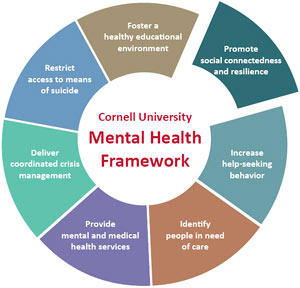Students study social skills to combat stress
By Susan Kelley

About 30 freshmen sat in a circle one evening last fall to meet for the first time as residents of Mary Donlon Hall's fifth floor.
They took turns answering questions drawn at random out of a bowl: What strengths do you bring to the floor? What are you nervous or excited about for the coming year? Have you lived in a dorm before?
The goal of this "community experience" was to create a dialogue among the students about what they want their life together to look like -- and to promote healthy social connections, said Resident Adviser (RA) Sejin Bai '11. "During the year, we often have incidents on the floor or in the building that require open dialogue among residents. I think the community experience that we implemented at the first floor meeting has the potential to help make these kinds of conversations more productive," she said.
Community experience is just one example of Cornell's comprehensive mental health framework in action. The framework -- seven key objectives that take cues from the best practices in the field (see chart) -- is made up of infrastructure, services and actions that help students thrive, support those at risk and protect those in crisis, said Tim Marchell, Gannett Health Services' director of mental health initiatives.
A comprehensive approach has become more important in response to student stress due to social and academic pressures. Nationally, the University of California's annual freshman survey reported in January that the emotional health of college freshmen has declined to the lowest level since data collection began 25 years ago.
Cornell promotes life skills and resilience
Cornell promotes life skills and resilience in many ways. Some of the formal strategies include:
• Programs and workshops: offered by EARS, Gannett Health Promotion, Learning Strategies Center and Cornell Minds Matter.
• Online alcohol education: All incoming first-year students are expected to complete Alcohol Wise, an online program, before arriving on campus.
• Online resources: Mental health assessments and stress management materials help students develop coping strategies and learn where to turn for help.
The framework includes the promotion of students' ability to make social connections, which can help offset stress, said Director of Residential Programs Joe Burke. Because Cornell undergraduates are so advanced academically, it's easy to forget that developmentally they are still learning how to create healthy relationships with friends, roommates and faculty, Burke said. For this generation, he notes, lessons in civility and respect often have not been learned in childhood, which for various reasons has largely been absent of "free playtime where children learn to read other people's emotional cues and have conversations to work out the issues that come up any time people live together."
To foster social skills, Cornell has developed a variety of community-building initiatives at Residential Programs, West Campus Houses and in housing areas for graduate and professional students.
A karaoke night or a group dinner organized by an RA helps some residents practice the fine art of hanging out with friends, rather than staying in their room to study. Group activities also help some students see that they can make contributions simply by participating, cooperating and listening. Too often "they only know one way [to participate]: to be involved in 84 things and to be the leader of 80," Burke said.
Diversity programs such as campus program houses foster inclusiveness and help promote student welfare. A Pre-Freshman Summer Program is designed to help students prepare for the challenges of their first year at Cornell, with summer session and enrichment courses, field trips, guest lectures and social and cultural activities.
Throughout the year on North Campus, RAs continue the "community experience" conversation with residents about how they want to treat each other and be treated, broadening the scope beyond their particular floor to include the dining hall, residence hall, classroom and campus.
"If we can demonstrate healthy relationships and civility and respect, not only is it going to help students inside the classroom but outside the classroom as well," Burke said.
Media Contact
Get Cornell news delivered right to your inbox.
Subscribe